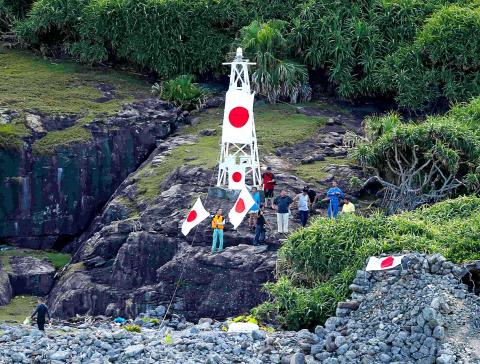The Japanese government has agreed to buy several privately owned islands in the East China Sea that are controlled by Japan, but also claimed by China and Taiwan, media reports said yesterday.
The government has agreed to buy three of the five main islands, called the Senkakus in Japanese and Diaoyutais (釣魚台) in Chinese, from the Kurihara family for ¥2.05 billion (US$26 million), Kyodo News agency and the Yomiuri and Asahi newspapers reported, citing anonymous sources.
A Japanese government official declined to confirm the deal and said negotiations were continuing.

Photo: AFP
Tensions over the islands have flared since April, when Tokyo Governor Shintaro Ishihara announced a plan for the city government to raise money to buy the islands so that they would not be vulnerable to purchase by a third party such as China.
Last weekend, Tokyo sent a team of experts to waters around the islands to survey fishing grounds and possible sites for development — although the central government forbade the expedition from setting foot on the islands.
China responded by calling the reported purchase “illegal and invalid.”
“For them to nationalize the Diaoyu Islands seriously violates China’s sovereignty and hurts the Chinese people’s feelings,” foreign ministry spokesman Hong Lei (洪磊) told reporters at a regular press briefing.
“I stress again that any of their unilateral acts with the Diaoyu islands are illegal and invalid. China’s determination will not change in terms of safeguarding its territory. China is observing the situation and will take necessary measures to defend its sovereignty,” Hong said.
While the move would clearly anger China, media reports said that the purchase is intended more as a means of squelching Ishihara’s more inflammatory proposal, which includes development plans. The islands are near key sea lanes and surrounded by rich fishing grounds and untapped natural resources.
No development would take place under the national plan, the reports said.
The media reports said funding for the purchase would require Cabinet approval, something likely to happen in the next week or two. They said the final deal could be closed by the end of the month.
Japanese Chief Cabinet Secretary Osamu Fujimura said the government and owner are still talking and he would not comment on details about the discussion.
“We are negotiating with the owner while we try to grasp where the situation stands between [the central government] and the Tokyo metropolitan government,” Fujimura said.
He said the government would make an announcement “when we reach a result after completing the process.”
Phone calls to a member of the Kurihara family and business went unanswered.

CARROT AND STICK: While unrelenting in its military threats, China attracted nearly 40,000 Taiwanese to over 400 business events last year Nearly 40,000 Taiwanese last year joined industry events in China, such as conferences and trade fairs, supported by the Chinese government, a study showed yesterday, as Beijing ramps up a charm offensive toward Taipei alongside military pressure. China has long taken a carrot-and-stick approach to Taiwan, threatening it with the prospect of military action while reaching out to those it believes are amenable to Beijing’s point of view. Taiwanese security officials are wary of what they see as Beijing’s influence campaigns to sway public opinion after Taipei and Beijing gradually resumed travel links halted by the COVID-19 pandemic, but the scale of

TRADE: A mandatory declaration of origin for manufactured goods bound for the US is to take effect on May 7 to block China from exploiting Taiwan’s trade channels All products manufactured in Taiwan and exported to the US must include a signed declaration of origin starting on May 7, the Bureau of Foreign Trade announced yesterday. US President Donald Trump on April 2 imposed a 32 percent tariff on imports from Taiwan, but one week later announced a 90-day pause on its implementation. However, a universal 10 percent tariff was immediately applied to most imports from around the world. On April 12, the Trump administration further exempted computers, smartphones and semiconductors from the new tariffs. In response, President William Lai’s (賴清德) administration has introduced a series of countermeasures to support affected

Pope Francis is be laid to rest on Saturday after lying in state for three days in St Peter’s Basilica, where the faithful are expected to flock to pay their respects to history’s first Latin American pontiff. The cardinals met yesterday in the Vatican’s synod hall to chart the next steps before a conclave begins to choose Francis’ successor, as condolences poured in from around the world. According to current norms, the conclave must begin between May 5 and 10. The cardinals set the funeral for Saturday at 10am in St Peter’s Square, to be celebrated by the dean of the College

CROSS-STRAIT: The vast majority of Taiwanese support maintaining the ‘status quo,’ while concern is rising about Beijing’s influence operations More than eight out of 10 Taiwanese reject Beijing’s “one country, two systems” framework for cross-strait relations, according to a survey released by the Mainland Affairs Council (MAC) on Thursday. The MAC’s latest quarterly survey found that 84.4 percent of respondents opposed Beijing’s “one country, two systems” formula for handling cross-strait relations — a figure consistent with past polling. Over the past three years, opposition to the framework has remained high, ranging from a low of 83.6 percent in April 2023 to a peak of 89.6 percent in April last year. In the most recent poll, 82.5 percent also rejected China’s